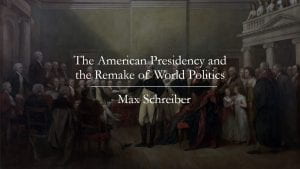
VOLUME LVII – Number 1
Max Schreiber
Abstract: This article explores how the Presidency’s creation in 1787 reenergized and reorganized American foreign policy, after the young nation struggled to effectively make deals and protect national interests upon winning independence from the British in 1783. Structurally, the Presidency enabled the federal government to avoid the division and indiscretion that prevented the States and Congress alike from achieving diplomatic success. Normatively, the Presidency also motivated European monarchs to begin treating the United States like a world rival; the office was viewed as a near-equal to the Sovereigns and it replaced European frustration toward Congress with excitement about the young country. Finally, the Presidency was a democratic victory, the first example in western history of the people getting a direct say through the republican Electoral College in how their leadership conducted foreign policy. These legal changes primed America for success abroad, and were soon emulated by the very European powers who had regularly out-negotiated American diplomats and Congress during the Articles of Confederation era.
Key Words: executive power, US diplomacy, the President, early American history
About the Author: Max Schreiber is a 2022 cum laude graduate of Harvard Law School and current attorney at the Hamilton Lincoln Law Institute in Washington, DC. He is also an active-duty intelligence officer in the United States Space Force, commissioned from Air Force Office Training School in March 2023. Between law school and OTS, Max was the 2022 Bolton Caldwell Fellow in the Solicitor General’s Office of West Virginia, where he authored briefs, petitions, and comments for cases argued before the US Supreme Court, federal circuit courts, and WV Supreme Court. Max recently published the article Talking Space, regarding strategic messaging and public diplomacy in the space domain, in the Air Force’s official quarterly strategy journal.
click here for full article | click here for full issue | click here to go to the next article



You must be logged in to post a comment.